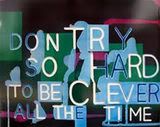 The Tibetan Dog Monastery
The Tibetan Dog MonasteryIn 1994, comedian Margaret Cho wrote about a visit to a Tibetan monastery for dogs in her blog. She reminisced about the trip today in Huffington Post:
"When I think of Tibet, I remember the politeness of the dogs, pulling back their dog lips and ever so gently taking the food from my hand with their open teeth, not wanting to bite my hand accidentally and then looking warmly into my eyes with a silent thanks. The thought of rioting and looting and blood in the streets there is too painful to comprehend."
The following is her post from '94:
I recalled a distant memory today, when pressed by sunny quiet. I told the story to friends over a late lunch. It was the kind of tale you start to tell before you know you're going to, when remembrance takes over thought and appears like magic before your casual beloved.
On a trip to Tibet, some years ago, I had visited an amazing monastery. Sacred art is commonplace on the rooftop of the world. The air is thin, but the devotion is given weight by the political oppression heaved upon it.
Everything smells of yak butter, much like the lobby of a multiplex movie theatre, because it is used in every aspect of monastic life, from sustenance to tribute. Tea is made from it, elaborately detailed sculptures are carved from it, candles are given substance from it; it is the physical manifestation of God.
We were many miles outside of the city of Lhasa, where we could order oxygen from room service, and I carried a spray can of air with me everywhere. To be short of breath constantly is to understand true needy desire. Headaches from altitude sickness were debilitating and we, the sea level Westerners, took to our beds or ventured out to brief shopping excursions, but you couldn't really buy your air outside the grand hotel, so inevitably we would return empty handed and winded from walking.
When the group had acclimated enough for travel we hired a driver, Dorje, a quiet and very tanned man, who looked like a Jack o' Lantern when he laughed, partly because he was so orange and he had few teeth.
Dorje navigated the unpaved roads to a tiny village at 15,000 feet. He was incredibly brave, and we sped through and up into the Himalayas at a terrifying clip. I don't remember the name of the place, it was something impossible to pronounce, but it had a sinister feel to it. The streets were empty, but the shops were all open, selling row after row of plastic women's shoes on racks set outside, as if the sandals and pumps were alluring enough to pull you into the store.
I walked out of the main street to the monastery, which sat huge and ornate, but covered in dust. I had sought it out, for the story about the place was that it was a special monastery for dogs. When wayward monks had been reincarnated and demoted from human life into canine existence, they were welcome here. There were a few monks there, who looked after the monastery full time, but it was the dogs who came to worship.
Upon entering, I was handed a ball of dough made with flour and yak butter. Gentle dogs, all colors and sizes, slowly rising from meditation, would walk toward me and wait patiently for their offering. I would feed each a piece of dough and the dog monk would bow in thanks and move back to allow the dog behind him to take his piece. Sometimes one would lick my hand in gratitude, but mostly the dogs were more concerned with returning to their individual and private conversations with the divine.
It was quiet, and the grounds around the temple were clean, even though under every awning there was a warm, furry swarm of puppies sleeping against the belly of another dog monk. You would walk by these animals, and they would look you in the eye, in sincere acknowledgement. "Yes, we are all here. Yes, we are all sharing this moment. Yes, we are all part of the eternal mystery of life." There was no barking, no fighting, no nipping, no chewing on shoes or chasing of cars. There were just dogs, of every hue and stripe, with cold, wet noses and sweetly sloping furry faces, sharing the wealth of mystical knowledge with scholars in saffron robes and shaved heads.
They were dogs that had not the karma of household pets, or strays at the pound, but that of the seekers of ecumenical truth. Even though they were no longer human, they yearned still to know God, and lived within the walls of this special house, built just for them.
Sigh.























